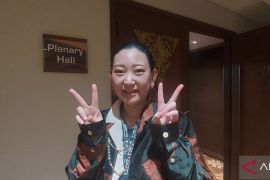"Hijabs for policewomen is a matter of human rights and is protected by the Constitution`s Chapter 28E, Article 1."Jakarta (Antara News) - The debate surrounding the introduction of headscarves for policewomen in Indonesia, a predominantly Muslim country, continues to rage on, with authorities denying accusations of a slow response to the issue.
"Starting tomorrow, women who wish to wear headscarves can do so on duty," stated the new National Police Chief General Sutarman, after a meeting with members of the Forum of Chief Editors at the National Police Headquarters, on November 19, 2013.
Wearing a headscarf is a human right, and he will therefore allow women to wear headscarves if they believe it is part of their religious obligations, he clarified.
"So, any woman member of the police force who wants to wear a headscarf can do so. However, since we do not have a budget for that, you will have to buy the headscarves," he pointed out.
The National Police currently have 20 thousand policewomen, representing only five percent of the forces 400 thousand personnel.
The generals statement was much appreciated by Muslim policewomen. Within just two days of the announcement, a number of women police officers in many regions such as Surabaya, Sidoarjo and Malang (East Java Province) decided to wear hijabs.
The women police officers were excited and did not mind buying their own headscarves since the police did not have a budget for procuring them.
For instance, out of the 146 policewomen stationed in Surabaya, 40 had officially requested to be allowed to wear the hijabs with immediate effect.
"This is the National Police chiefs decision. Policewomen are now allowed to wear head scarves," Surabaya Police Chief Sr. Comr. Setija Junianta had stated, as quoted by tribunnews.com.
The banning of hijabs was based on a police regulation on uniforms issued in 2005, with the exception of Aceh, which applies Islamic laws that oblige women, including policewomen, to cover their hair.
For the sake of uniformity, Sutarman asked policewomen who wished to wear headscarves to refer to the ones used by policewomen in Aceh with regard to color and model.
A draft regulation had been prepared for policewomen wishing to wear headscarves, under former National Police Chief General Timur Pradopo, General Sutarmans predecessor.
Pradopo had also proposed 61 designs for policewomen, which could be used as a reference when issuing any regulations in the future.
In consideration of the Islamic obligation that Muslim women should cover their bodies from head to toe, Sutarman also said that policewomen were free to wear long pants rather than their knee-length skirts, if they so preferred.
However, the media later reported a confidential internal telegram signed by National Police Deputy Chief Commissioner General Oegroseno, on Nov. 28, instructing women members of the police force to stop wearing hijabs until the National Police had issued a regulation on the new type of uniform.
According to The Jakarta Post, Oegroseno has stated that the decision was made after learning that women members of the police had worn scarves of different colors and designs with their official uniforms.
"The wearing of the hijab by policewomen, from Aceh to Bengkulu and Papua, must be based on a written regulation. Thus, we should wait for the National Police Chiefs regulation on uniform hijabs," clarified Oegroseno at the Air Police Corps headquarters in South Tangerang, Banten.
Oegroseno indicated that Indonesian policewomen insisting on wearing hijabs could be transferred temporarily to Aceh police offices, where they will be allowed to wear them on duty.
Sutarman confirmed the postponement of the decision to allow women police officers to wear hijabs.
"I ordered the suspension after seeing that some policewomen were wearing red hijabs, some white hijabs, while others wore hijabs with a combination of colors. It is not standardized at all," he explained.
The postponement has triggered criticisms particularly from Muslim leaders and legislators.
"Hijabs for policewomen is a matter of human rights and is protected by the Constitutions Chapter 28E, Article 1," stated Almuzzammil Yusuf, the Deputy Chairman of the Indonesian House of Representatives Commission III, expressing his regret.
"It should not be postponed. It would be wise to allow policewomen to wear hijabs even as they await the issuance of a decree (on the hijab for policewomen)," he noted.
The postponement of the order to permit policewomen to wear hijabs on duty cannot be attributed to budget constraints since all policewomen would be happy to spend their money on a hijab that is similar to ones being used by their counterparts in Aceh or any of the 61 designs suggested by former National Police Chief General Timur Pradopo, Almuzzammil Yusuf stated.
"Budgetary constraints are not that much of a problem. The Commission III will support such an allocation in the 2014 State Budget, so that it can be implemented. There is no need to wait until 2015," he further added.
He also disagreed with Deputy Police Chief Commissioner General Oegrosenos statement that the issue of whether the policewomen should wear hijabs or not was an internal matter of the police department.
"The Deputy Police Chiefs statement is baseless," he noted.
The hijab being worn by policewomen was an international trend that had been honored by countries such as Britain, Canada and Sweden, he added.
Hasyim Muzadi, former Chairman of Nahdlatul Ulama (NU), Indonesias largest Muslim organization, insisted that the police give its women members the freedom to wear hijabs on duty.
"I think its logical for the police to give (them) freedom. While the policewomen should be given a choice regarding wearing hijabs, there should be a standard," he confirmed recently.
The postponement was also criticized by Muhammad Alman of the North Maluku Muhammadiyah Muslim organization.
"When the police chief announced the decision allowing policewomen to wear hijabs, Muslim policewomen were enthusiastic about it, but two weeks later, they were disappointed when the decision was postponed," he explained.
In other Muslim majority countries, such as Malaysia and the Arab nations, policewomen have been allowed to wear hijabs for a long time.
"So, Muslim policewomen in Indonesia should be given similar freedom," he said.
He pointed out that other institutions such as the Indonesian Defense Forces and airline companies should also allow their women employees to wear hijabs on duty.
Commenting on the reactions, the National Polices Deputy Chief Oegroseno added that the postponement of the decision to allow policewomen to wear hijabs should not be an issue.
The National Police has not banned the hijab but has only postponed the implementation for the sake of uniformity, he clarified.(*)
Reporter: Fardah
Editor: Fardah Assegaf
Copyright © ANTARA 2013











